Top 6 Garage Door Materials
In this article, we’re discussing the top 6 garage door materials. These are preferred by manufacturers for a reason and we’ll find out here. We’ll break down the ins and outs of six popular materials: glass, fiberglass, steel, aluminum, wood, and vinyl. Each section is dedicated to one material, where we’ll discuss its advantages, disadvantages, and best uses in your home. By the end of this read, you’ll have a clearer picture of what each material has to offer, helping you make a more informed decision for your own garage door upgrade.
1. Glass Garage Doors
Choose this material if:
- You want to maximize natural light in your garage space
- Your want to complement your modern architectural style home
- You are looking for indoor and outdoor visual connectivity
- Durability and safety are important
- You are prepared for the higher cost in exchange for style
Glass garage doors are a top pick for a modern look. They brighten up your garage with natural light and give your home a contemporary edge. Consisting of large panes set in a sturdy frame, these doors enhance the garage and the homes atmosphere.
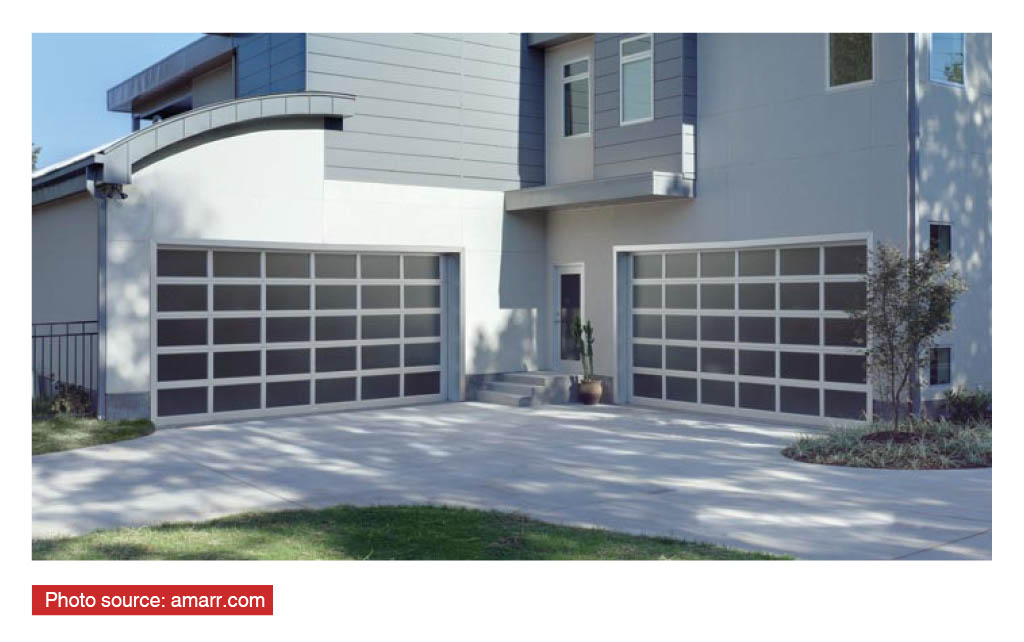
Glass allows daylight to enter the garage, so the space feels open and pleasant. Though visually striking, glass doors are also practical. They are typically crafted with tempered glass, which is stronger and more resilient than standard glass. The primary considerations with glass are its higher cost and the need for regular upkeep to keep the panes sparkling. Nonetheless, the benefits it provides are often worth the investment.
2. Fiberglass Garage Doors
Choose this material if:
- Severe weather conditions are a concern and need a door that resists warping and cracking
- You like the look of wood but prefer a material that needs less upkeep
- You want a lightweight garage door for easier operation and reduced wear on mechanical components
- You want good insulation
- You want customized designs and various texture options
Fiberglass garage doors give you that sought-after wood grain look without the maintenance of real wood. This material withstands common issues like warping, rusting, and rotting. They are suitable for climates that experience extreme weather.
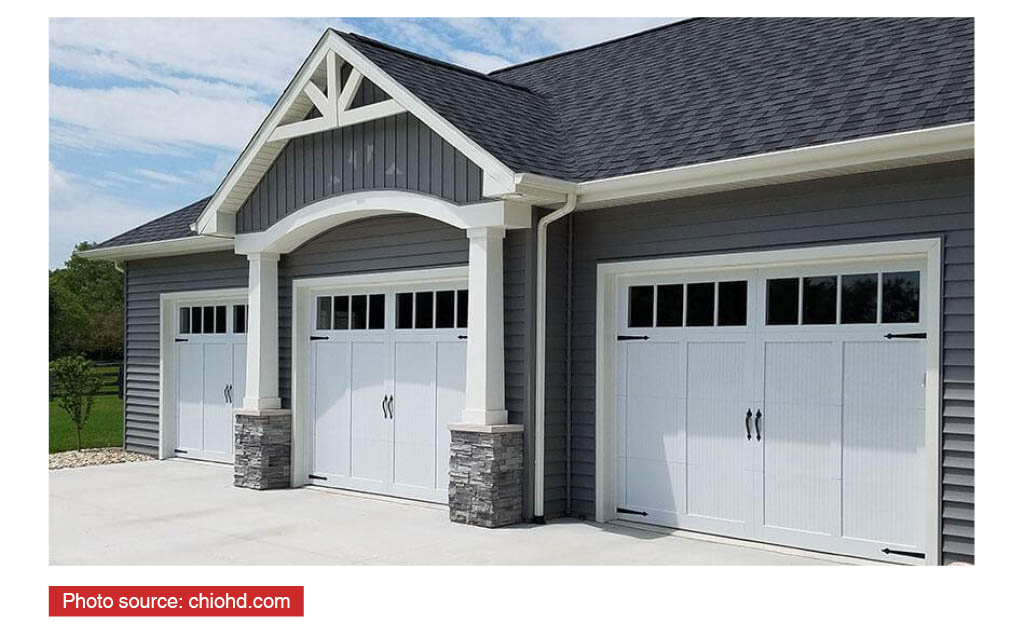
Though they might not be the best in freezing temperatures as they can get brittle. You can use it to resemble wood without the upkeep. They don’t dent, rust, or warp easily. So if you’re after a low-upkeep option that still looks good, fiberglass could be your go-to. Additionally, the lighter weight of fiberglass lessens the stress on the mechanical parts of the garage door system, potentially lengthening its operational life. These doors are effective in maintaining a stable temperature inside the garage, which might help in reducing heating and cooling costs. Fiberglass is a practical option for those who value both looks and longevity.
3. Steel Garage Doors
Choose this material if:
- Security and durability are your top priorities in a garage door
- You need a cheaper but durable option
- You want options that can look like wood
- Longevity and resistance to elements are important due to the climate in your location
- You want to add insulation
Steel is often chosen for its solid protection and affordability. It stands up well against various environmental challenges and comes in different thickness levels. The thicker options give greater defense against impacts, thus better protection.
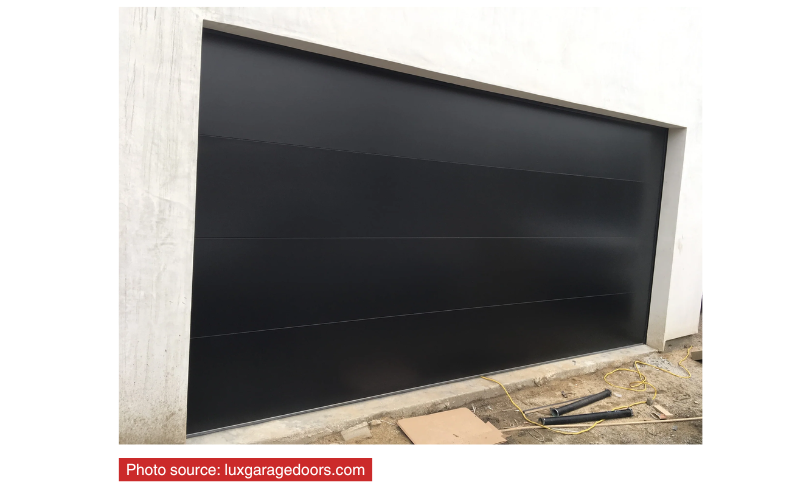
Insulating options are available to help maintain temperature in the garage. Beyond practicality, steel garage doors are versatile in style and finish, fitting well with many home exteriors. They come in a range of panel styles, from classic raised panels to modern flush designs. You can choose from painted finishes to textured, faux wood look that combines the strength of steel with the appearance of natural wood. This material is a reliable choice for homeowners who prioritize durability, function, and style without significant upkeep cost.
4. Aluminum Garage Doors
Choose this material if:
- You need a lightweight door that doesn’t put too much strain on the mechanism
- Corrosion resistance is important because your property is near the ocean or in a high humidity area
- You prefer a modern, minimalistic look
- Manual operation of the door is occasionally necessary
- You are looking for a mid-range price point with reliable performance
Aluminum garage doors are like the lighter, rust-resistant cousin of steel doors. They’re perfect if you want something that won’t strain your garage door opener with too much weight. Plus, they do well against corrosion, which makes them a smart pick for humid or coastal areas.
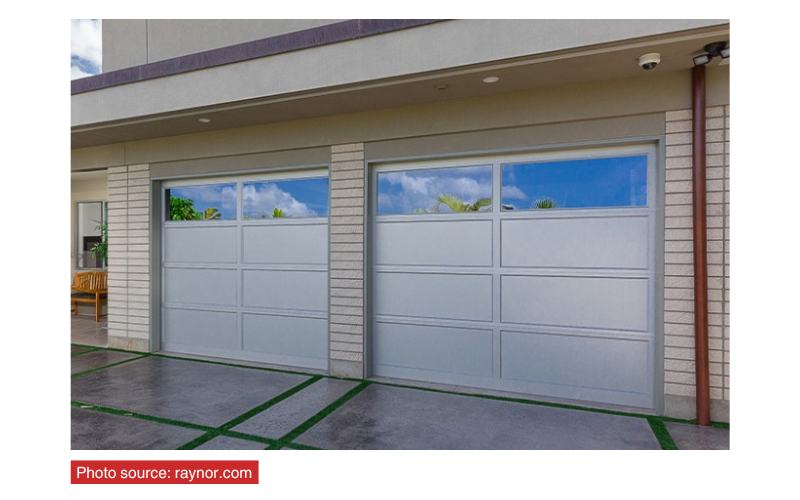
They come in various finishes and colors, but keep in mind, they might not stand up to hits and bumps as well as some other materials. Aluminum is also favored for its contemporary look, fitting well into modern home designs. It is customizable in terms of finishes, colors and panel options. This allows homeowners to match the design of their house. Although lighter and less secure than steel, aluminum doors are easy to operate manually and has a good balance between functionality and style.
5. Wood Garage Doors
Choose this material if:
- You want the classic appearance of wood
- You are willing to invest time and resources in maintenance for lasting beauty
- You want a customizable door to fit the style of your home
- Your home’s design is enhanced by the rich textures and colors of real wood
Wood garage doors are all about adding natural beauty to your home. Each type of wood has a different color and grain, from rich mahogany to solid cedar. You can choose from a variety of woods and finishes to match your home’s style.

This type of garage door does require more attention to keep them looking their best, like regular staining or painting and keeping an eye out for moisture or insect damage. But for many, the classic look of wood and the ability to customize designs is well worth the effort.
6. Vinyl Garage Doors
Choose this material if:
- You are looking for a door that stands up to frequent use and resists dents and scratches
- Minimal maintenance is a priority, with only occasional need for repainting
- Long-term durability in a variety of climates is important
- You prefer not to worry about rust or fading over time
Vinyl garage doors are the tough ones of the garage door world. They’re built to withstand wear and tear from kids, weather, and time without rusting, denting, or peeling. While they might not have the same feel as wood or aluminum, you can still find them
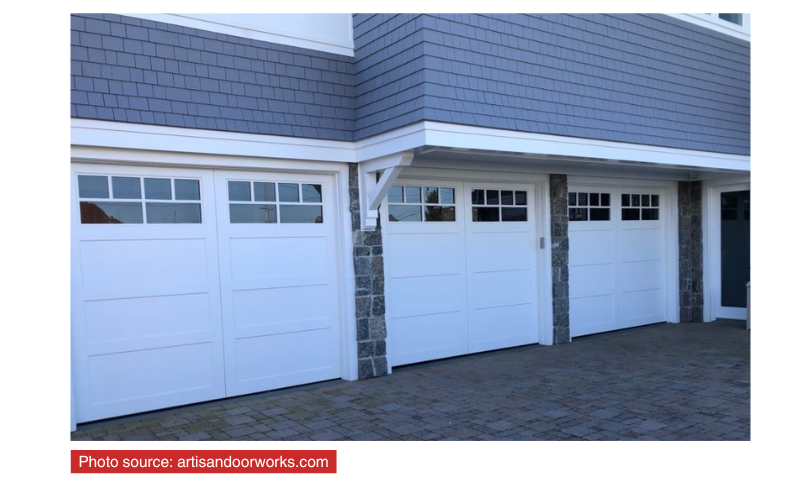
in a variety of designs and colors. They’re pretty much maintenance-free, save for the occasional hose down to keep them clean. Vinyl is often reinforced with steel, which adds to its strength without significantly increasing its weight. This combination makes vinyl doors a practical option for those who desire a sturdy, attractive, and low-maintenance garage door. They are cost-effective and provide a clean look that fits well with various architectural styles.
Conclusion
In summary, when choosing a garage door, you have several options. Fiberglass is great for a wood-like look without the upkeep, perfect for coastal homes but not the best in freezing temps. Steel is your go-to for security and durability, with plenty of style options but a need for some care against dents and rust. Aluminum offers a lightweight, rust-resistant alternative to steel, ideal for larger doors but prone to dents. Wooden doors add a classic touch and can be customized, though they demand regular maintenance to combat weather and pests. Vinyl doors are the low-maintenance, durable choice, resistant to most wear and tear but with fewer customization options. Each of these garage door materials has its own set of pros and cons, so consider your home’s style, your climate, and your lifestyle when making your choice.

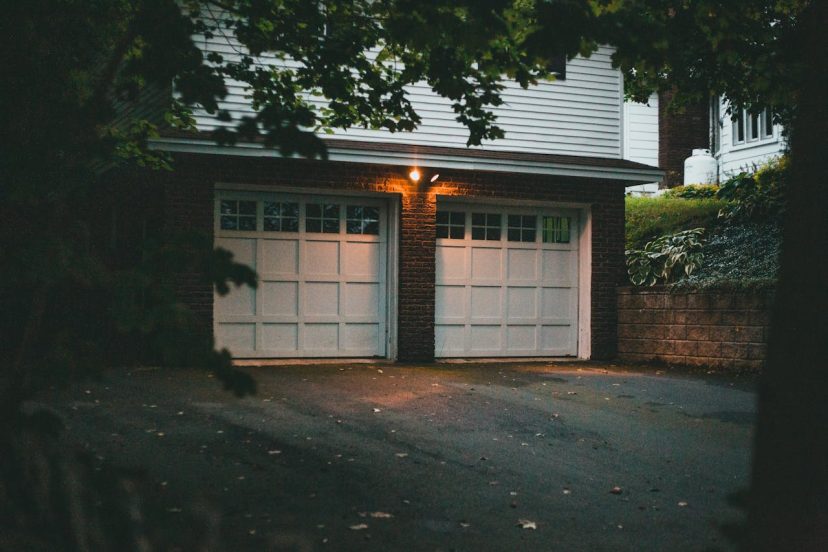



Comments are closed.